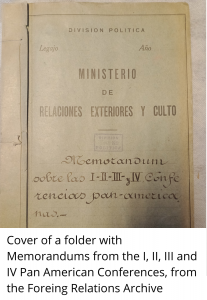Contributed by Graduate Student Santiago Mayochi
I spent this summer in Buenos Aires, Argentina, doing research for my Ph.D project, which focuses on the Argentine response to the U.S. expansion over the Caribbean, especially Cuba. The Pan American conferences and the interventions in the Caribbean raised the alarms for many people in Argentina who gave speeches and wrote in newspapers and magazines of that time against the United States and its increasing influence in Latin America. While some viewed the United States as an existential threat to Latin American independence, others saw it as a threat to Argentina’s economic growth and geopolitical ambitions. For many of them, this opposition to U.S. dominance became a defense of Latin Americanism or Hispanism because of the cultural differences between the United States and Latin America. For others, the opposition came in the form of what can be considered as anti-Americanism.
To access the documents regarding this, I traveled to Buenos Aires and visited the newspaper archive of the Library of Congress. The repository holds magazines from the time where many intellectuals of the time wrote and microfilms of newspapers back then, where many intellectuals and politicians expressed their opinions about the events in the Caribbean. I also visited the Foreign Relations Archive, which contains the records of the Pan American Conferences and related articles.
Over my weeks there, I found the letters that José Martí wrote for the newspaper La Nación about the First Pan American Conference (1899-1890). During those years, the revolutionary, poet, and father of Cuban nationalism, José Martí, was living in New York and was a correspondent for La Nación, the most important newspaper of Argentina back then. In his letters, Martí denounced the Conference as an attempt of the United States to formalize his dominance in the Caribbean and to create an economic scheme that would benefit them over the Latin American countries. Martí also praised the action of the Argentinean delegation, led by Roque Sáenz Peña, who stood against the customs union proposed by the United States. I also found these speeches from Saenz Peña and comments on them. This allowed me to compare the ideas of José Martí and Roque Sáenz Peña, who, despite being from very different countries, shared very similar ideas.
Furthermore, I found news related to later events, like the Spanish-American War, the occupation of Cuba, the blockade of Venezuela, the Drago Doctrine, the second, third, and fourth Pan American Conferences, and the protest and repression of the PIC (Partido Independiente de Color) in Cuba in 1912. For this, I did not just search La Nación, but another important newspapers of the moment, like El País, La Tribuna, and Sudamericano. This will help me get a better understanding of the opinions of these events, not only from the press but some intellectuals, like Manuel Ugarte, who signed some of the articles. All these articles were scanned from the microfilm and sent to me by email.
Regarding the Foreign Relations Archive, I consulted memorandums, ratifications, and related newspaper articles from other countries. As expected, the conference I found more information about was the fourth one, carried out in Buenos Aires in 1910. These documents, I hope, will provide more precise information about the events of those conferences and Argentina’s stand in them.
All of this was possible thanks to the sponsor of El Instituto to whom I send my infinite gratitude.